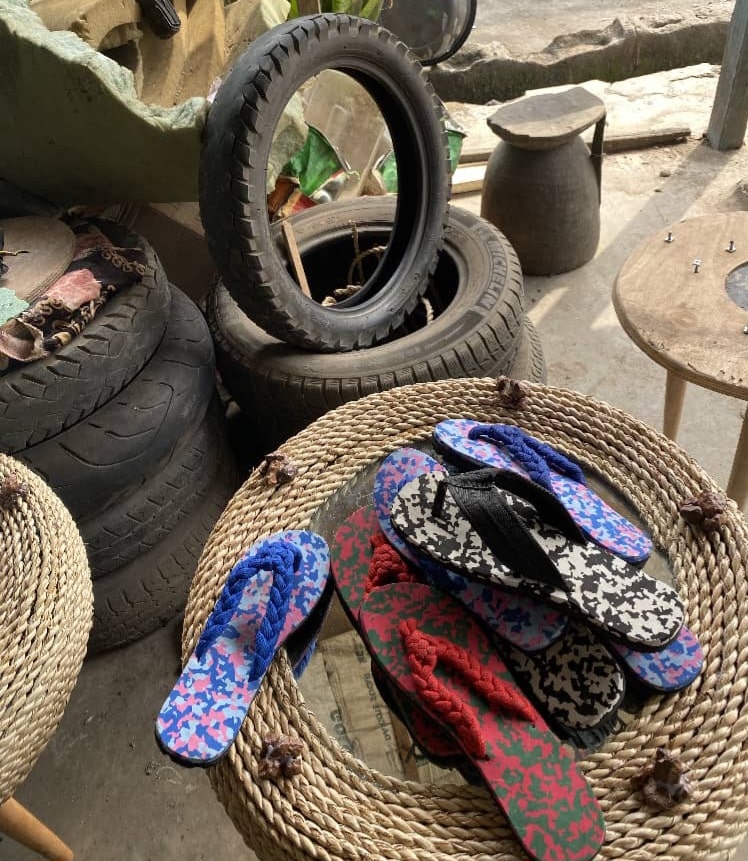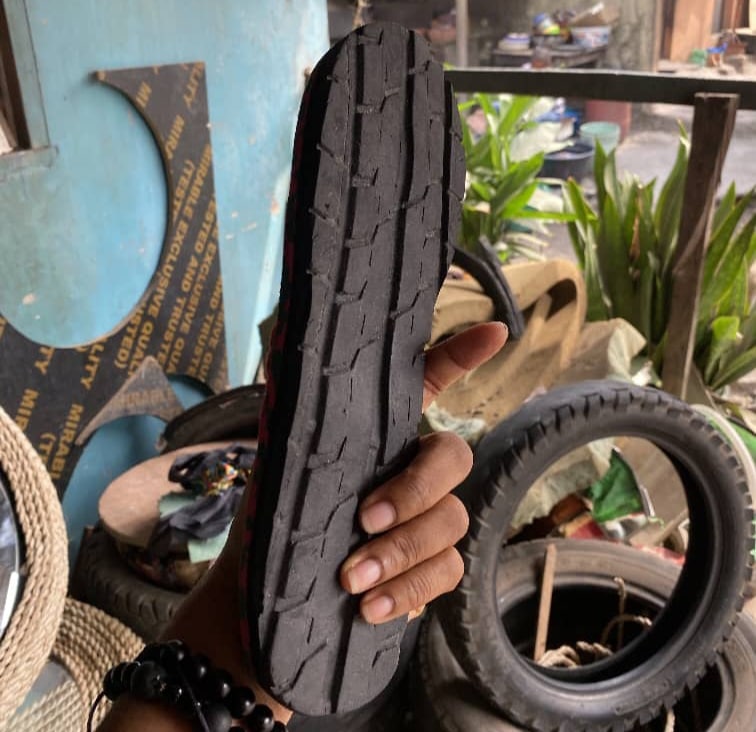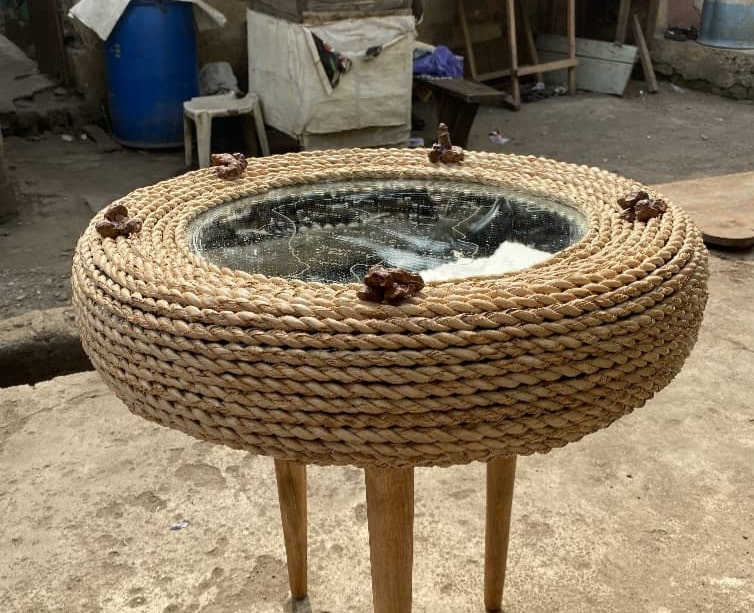Nigeria News
Nigerian Waste Manager Transforms Scrap Tyres Into Sustainable Lifestyle Products, By Esther Kalu

“Beauty lies in the eyes of the beholder,” this famous saying defines the lens through which Amidu Mohammed, the Chief Executive Officer (CEO) and founder of PlastiBuild Creative Solutions, find waste (scrap tyres) attractive.
The 24-year-old waste manager, through his startup, officially founded in 2018, explores mainly scrap tyres as raw material to help people embrace sustainable lifestyles in his community.
“I am naturally attracted to waste,” says Mr. Amidu, a graduate of Chemistry Education from Usmanu Danfodiyo University Sokoto, as he pointed out what inspired his passion to create beauty out of waste.
The resident of Bariga community, a district and suburb area in Lagos State, Nigeria, noted that the appalling waste crisis inspired his innovation in the state. According to him, the smell of burning tyres caressed nostrils every morning, and scrap tyres littered drainage systems in the community, causing flood and pollution.

“I’ve lived here for about 20 years. On a normal day, we wake up to a smoky atmosphere because there is either a tyre burning somewhere or there is a guy who is about to be lynched.
“I grew up to experience Lagos as a metropolitan area battling with the waste crisis. In my street in Bariga, we see people burning tyres on the streets and emitting into the atmosphere,” he explained.
Lagos produces approximately 13,000 tons of waste per day, according to the Lagos State Waste Management Agency, while Nigeria produces over 32 million tons of solid waste per year, with only about 20-30 percent of it being collected and managed correctly.

Furthermore, in a 2023 report, the Director-General, National Environmental Standards and Regulations Enforcement Agency (NESREA), Aliyu Jauro, disclosed that a staggering one billion end-of-life tyres are generated globally, with approximately four billion currently occupying landfills and stockpiles worldwide
Quoting statistics, the NESREA boss also disclosed that in Nigeria alone, the automobile sector generates around 10 million tyres yearly without environmentally friendly management traceability data.
Amidu noted that some of these realities spurred his passion for starting his company after he figured out the possibilities of exploring the tyre waste defacing his community.
“I was able to connect the dots to realise if I make products with tyres, it would actually last longer. Wrapping all those ideas together was how I started PlastiBuild,” he said.

In Africa, where environmental challenges often prevail, it is essential to consider sustainable living practices, and Amidu’s innovation offers such solutions. His sustainable startup company creates furniture and footwear from scrap tyres to solve the waste crisis and environmental pollution in his community.
Embracing sustainable living practices in Africa can not be overemphasized as it is part of the solutions we need for a healthier and sustainable continent.
Transforming scrap tyres into functional products
On 25th January 2024, during a visit to Amidu’s workstation, a space filled with waste and upcycled tyres made into furniture and footwear, he explained the concept behind the most recently completed furniture.
He said the unique, vintage-inspired Raffia wrapped center table was made from stones and raffia ropes.
Also, he emphasized how there is a cultural significance behind the furniture piece, particularly in regard to the people of Ilesa in Osun State. Amidu said, “It is not just furniture for furniture’s sake.”
“This is called Raffia wrapped center table with specifics from the Ogedengbe edition from Ilesha Town. The stones signify the strength of the Ogedengbe warrior. Ogendengbe was a very strong soldier in the olden days.
“The four stones placed beneath signify the four royal families in Ogedengbe which are called Birodun, Bilagbayo, Blair and Bilailere,” he explained.

According to him, the stone placed on top of the four stones represents the current ruling family called the Aromolayan dynasty.
The young CEO disclosed that he got the raffia ropes as waste from animal traders from Sokoto, while the table legs were wood waste from a sawmill in Bariga.
Amidu said that women in the community usually buy these wood waste to use as firewood, but he buys them instead, and alongside a local wood carver, he upcycled it into functional furniture.
“I got the mirror in Amu market in Mushin. The Ogedengbe map on it is a printing engraving done in Shomolu, the largest printing hub in Nigeria,” he said.
The waste manager also disclosed that the footwear made from tyres could last 24 months before replacement.
Value Impact of Sustainable Lifestyle
According to the United Nations Environment, Sustainable Lifestyles are ways of living, social behaviors, and choices that minimize environmental degradation. In essence, sustainable living allows people to understand how their lifestyle choices can make or mar the world.
Amidu pointed out that he provides a source of income for the local artisans who work with him, thereby contributing economically to his community.
He also disclosed that the young boys who help him with these tyres are majorly street urchins, and when they bring them to him, he pays them.
“On a normal day, they could steal or bully someone to get that same money. The process of creating our sustainable lifestyle products has someone involved that is gaining from it economically,” he added.
Regarding social impact, he noted that the scrap tyres were used to block the drainage, but collecting them has drastically eliminated the effect in the community.
In a phone interview with a sustainability expert, Okundalaye Osamudiame, who also works as the Head of operations for Sustyvibes, a sustainability community movement guided by the principles of gender equality and environmental justice, she highlighted some of the value impacts of promoting sustainable lifestyle in the community through upcycling and recycling approaches.
She said that a more sustainable environment and lifestyle helps to preserve the ecosystem, protect biodiversity, and combat climate change.
Osamudiame said: “That is one of the things we are experiencing at the moment. For example, the weather in Lagos currently has a harsh harmattan, which is usual.”
The sustainable expert noted that for the Nigerian economy, sustainable living creates competitiveness and new innovation, while in the social context, it ensures improved equality, human rights, and well-being.
It focuses on the main SDG goals we are trying to promote. It helps us be more aware of our cultural diversities as regards sustainability, she added.
Future possibilities
A report conducted by a research expert, P. Smith, highlighted the worldwide revenue of the Sustainability market, which is estimated at 339 billion U.S. dollars in 2022 and will double by 2026.
Similarly, Accenture’s online survey also noted that 60% of consumers globally are ready to pay more for sustainable products. What does this say about the sustainability lifestyle market, and what does the future hold for the industry?
Ms. Osamudiame believes that the future possibilities of a sustainable lifestyle are shifting to more renewable sources of energy like solar, and this can power our homes and businesses without any greenhouse gas.
The sustainability and climate change expert said she also sees a future when the Nigerian economy embraces reuse, reduce, recycle, and repair models.
“I see more of a green plant dieting – just a more healthy animal option. We can think of consuming animals that are raised in a more natural environment. I see an economy that embraces the culture of sustainability,” she added.
This article was written by Esther Kalu.
